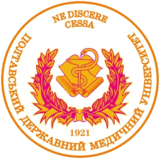Please use this identifier to cite or link to this item:
http://repository.pdmu.edu.ua/handle/123456789/19808| Title: | Examinations Of Indian Patients Who Have Diabetes Mellitus |
| Authors: | Jha, Sahil kumar Rauth, Upasona Kovalev, Serhii Volodymyrovych Deviatkina, Nataliia Mykolayivna Ковальов, Сергій Володимирович Дев'яткіна, Наталія Миколаївна |
| Issue Date: | 2023 |
| Publisher: | Journal of Pharmaceutical Negative Results, India |
| Citation: | Examinations Of Indian Patients Who Have Diabetes Mellitus / Jha Sahil kumar, Rauth Upasona, S. V. Kovalev, N. M. Deviatkina // Journal of Pharmaceutical Negative Results. – 2023. – Vol. 14, special issue. – Р. 543–545. |
| Abstract: | Blood glucose (or blood sugar) levels that are elevated in people with diabetes are chronic metabolic conditions that over time cause substantial harm to the heart, blood vessels, eyes, kidneys, and nerves. The most prevalent type of diabetes is type 2, which often affects adults, and develops whenever the body stops producing enough insulin or becomes resistant to it. Type 2 diabetes has been much more common over the last three decades in nations of all income levels. Diabetes type 1 is a chronic condition in which the pancreas produces little or no insulin by itself. It was previously referred to as juvenile diabetes or insulin-dependent diabetes. The availability of affordable medical care, particularly insulin, is essential for the survival of individuals who have diabetes. Diabetes mellitus, which is primarily defined by hyperglycemia, polyuria, and polyphagia, has developed into a serious and persistent metabolic condition as a consequence of a dynamic interactions of hereditary and environmental variables. Numerous diabetes problems might arise from uncontrolled high blood sugar. Long-term diabetes causes severe complications, some of which are fatal. All around the world, the prevalence of diabetes patients is increasing at epidemic rates. Annually, diabetes and related disorders consume a sizable percentage of the national health budget. The etiopathogenesis of the disease and the emergence of the outbreak are both influenced by a number of adverse outcomes. According to reports, diabetes, which has no known cure, can be managed by maintaining daily self-care, receiving good diabetes education, and making significant gains.The untreatable condition of diabetes may be managed by maintaining personality in everyday life, providing appropriate diabetes education, and making significant advancements in knowledge, attitudes, skills, and management. In this scientific report, we will have presented reports which included data on the subjects' fasting, postprandial, and glycated hemoglobin blood sugar levels, lipid profile, LFT, and RFT. The data results analyzed is in table form. |
| Keywords: | hyperglycemia diabetes mellitus pathogenesis of diabetes mellitus risk and management of diabetes free fatty acids and hemoglobin |
| DOI: | 0.47750/pnr.2023.14.S01.65 |
| URI: | http://repository.pdmu.edu.ua/handle/123456789/19808 |
| Appears in Collections: | Наукові праці. Кафедра фармакології, клінічної фармакології та фармації |
Files in This Item:
| File | Description | Size | Format | |
|---|---|---|---|---|
| Examinations_2023.pdf | 172,32 kB | Adobe PDF | View/Open |
Items in DSpace are protected by copyright, with all rights reserved, unless otherwise indicated.



